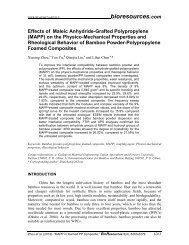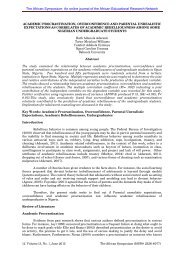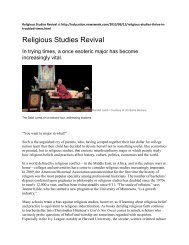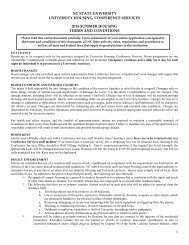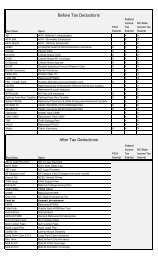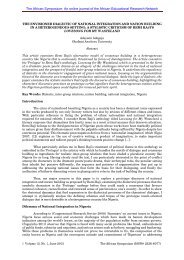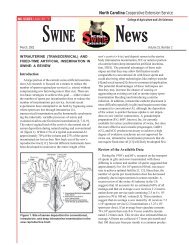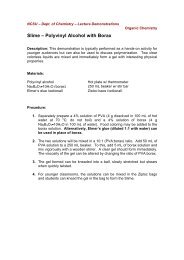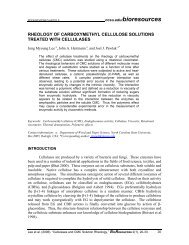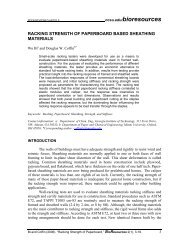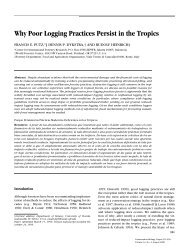Dictators, Songwriters, and the Negotiation of Censorship
Dictators, Songwriters, and the Negotiation of Censorship
Dictators, Songwriters, and the Negotiation of Censorship
You also want an ePaper? Increase the reach of your titles
YUMPU automatically turns print PDFs into web optimized ePapers that Google loves.
Starmakers: <strong>Dictators</strong>, <strong>Songwriters</strong>...<br />
<strong>of</strong> musical practices is <strong>the</strong> coercion <strong>of</strong> an openly repressive government.<br />
One limitation <strong>of</strong> many Anglo-American <strong>the</strong>orists <strong>of</strong> pop music is <strong>the</strong>ir<br />
tendency to over-privilege racial <strong>and</strong> class divisions (Hebdige, Grossberg).<br />
For many critics, <strong>the</strong> main function <strong>of</strong> rock is to distinguish one subculture<br />
from ano<strong>the</strong>r. However, what is remarkable in Argentine rock is not <strong>the</strong><br />
division between classes or subgroups <strong>of</strong> young people, but ra<strong>the</strong>r <strong>the</strong>ir<br />
common identity created in a dialectical relationship against a repressive<br />
third party. Peter Wicke <strong>and</strong> Anna Szemere, through <strong>the</strong>ir work on music<br />
under former soviet bloc regimes, have shown how those governments’<br />
vilification <strong>of</strong> rock music in fact encouraged oppressed listeners to hear <strong>the</strong><br />
texts in a political mode, <strong>and</strong> transformed <strong>the</strong> music into a political tool. A<br />
similar phenomenon took place in Argentina, though arguably on a larger<br />
scale, since in addition to <strong>the</strong> music being repositioned as a political text,<br />
<strong>the</strong> genre’s popularity <strong>and</strong> commercial success also surged, as did that <strong>of</strong><br />
many <strong>of</strong> its artists. Beyond cultural <strong>and</strong> economic implications, however,<br />
ano<strong>the</strong>r important consideration sets apart <strong>the</strong> Argentine rock music <strong>and</strong><br />
its interaction with <strong>the</strong> repressive regime: <strong>the</strong> massive scope <strong>of</strong> <strong>the</strong> regime’s<br />
atrocity. The project <strong>of</strong> <strong>the</strong> Proceso was essentially genocide. In <strong>the</strong> face <strong>of</strong><br />
such an effort to eliminate or silence an entire segment <strong>of</strong> <strong>the</strong> population<br />
(anyone not politically right <strong>of</strong> center), <strong>the</strong> act <strong>of</strong> writing was indeed<br />
subversive, <strong>and</strong> results have been long-lasting.<br />
The process <strong>of</strong> negotiation with <strong>the</strong> regime is exemplified by <strong>the</strong><br />
lyrics penned by Charly García on <strong>the</strong> paradigmatic album Pequeñas<br />
anécdotas sobre las instituciones. Recently, <strong>the</strong> original uncensored<br />
version <strong>of</strong> <strong>the</strong> lyrics <strong>of</strong> this Proceso-era album came to light, <strong>of</strong>fering<br />
scholars <strong>the</strong> rare chance to compare pre- <strong>and</strong> post-censorship versions, <strong>and</strong><br />
thus analyze <strong>the</strong> inner-workings <strong>of</strong> negotiation with a dictatorship. It is<br />
hard to call any repressive action by a military regime “positive,” but in<br />
<strong>the</strong>se coercion-influenced texts by this <strong>and</strong> o<strong>the</strong>r songwriters <strong>of</strong> <strong>the</strong> era, one<br />
can witness a level <strong>of</strong> lyricism that approaches <strong>the</strong> sublime, <strong>and</strong> that helped<br />
launch <strong>the</strong>se artists to mega-stardom. I will compare “before” <strong>and</strong> “after”<br />
lyrics from <strong>the</strong> album mentioned, <strong>and</strong> examine many o<strong>the</strong>rs, to paint a<br />
53



